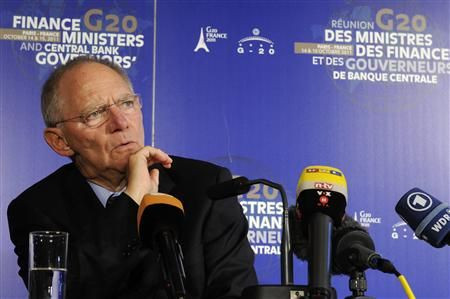French Credit Review Threatens Euro Zone Rescues

Moody's decision to review France's triple-A credit rating cast new doubt Tuesday on Europe's hopes of drawing a line under its sovereign debt crisis, five days before a crucial EU summit.
The U.S. ratings agency said late Monday it may slap a negative outlook on France's Aaa rating in the next three months if the costs for helping bail out banks and other euro zone members stretch its budget too much.
The warning, which sent the risk premium on French government bonds shooting up to a euro lifetime high, came as European Union leaders are preparing measures to protect the region's financial system from a potential Greek debt default.
That plan includes a new rescue plan reducing Greece's debt, strengthening the capital of banks with exposure to troubled euro zone sovereigns and leveraging the euro zone's rescue fund to prevent market contagion to bigger economies.
German leaders on Monday doused market hopes of a miracle cure at Sunday's Brussels summit, saying no one should expect a definitive solution.
Finance Minister Francois Baroin insisted that France's AAA status was not at risk but acknowledged that the 1.75 percent growth forecast on which the government has based its 2012 budget was over-optimistic and would have to be revised down.
It (France's AAA credit rating) is not in danger because... we will even be ahead of schedule on passing deficit reduction measures, Baroin said on France 2 television.
Asked if next year's growth forecast would have to be reduced in light of weak economic prospects, he added: It is probably too high compared to the development of the economic situation. We will not adapt it today.
We will adapt it, that much is clear.
France and Germany, the two strongest economies among the 17 euro zone members, form the backbone of the 440-billion-euro EFSF rescue fund and are drafting a crisis-fighting strategy for Sunday's summit.
Without France's triple-A rating, the whole edifice of rescue measures for troubled peripheral euro zone states would begin to crumble, putting more weight on Germany, where there is a strong public backlash against bailouts.
Moody's said Paris' progress on crucial fiscal and economic reforms as well as potential adverse developments in financial markets and the economy would be taken into account in the review.
Monday's review was only a preliminary step, but a negative outlook would be a sign that Moody's could downgrade its rating on France in the next couple of years. Moody's placed the United States's Aaa rating on negative outlook in August.
The two other major ratings agencies, Standard & Poor's and Fitch, reaffirmed Paris' triple-A rating in August when French banks came under fierce market pressure over their exposure to the weakest euro zone sovereigns.
FRENCH SPREAD HITS RECORD
In early market reaction on Tuesday, the spread on French 10-year bonds over benchmark German bunds jumped to a 16-year high of 101 basis points, more than 1 percentage point.
Safe-haven German Bund futures rose on ebbing hopes of a quick solution to the euro zone debt crisis after Moody's warning on France's triple-A rating.
European shares fell, partly due to news that China's growth slowed slightly more than expected in the third quarter. chief Josef Ackermann, who is also chairman of the IIF, resisting pressure on both fronts.
Ackermann has objected to efforts to force banks to raise more capital and IIF lead negotiator Charles Dallara told Reuters on Monday that bigger writedowns on Greek bonds could only happen if policymakers addressed broader sovereign debt issues in Europe.
(Additional reporting by Walter Brandimarte in New York, Nick Vinocur in Paris, a Emelia Sithole-Matarise in London, Edward Taylor in Frankfurt; Writing by Paul Taylor, editing by Mike Peacock)
© Copyright Thomson Reuters {{Year}}. All rights reserved.





















